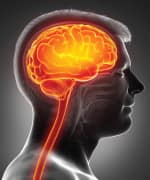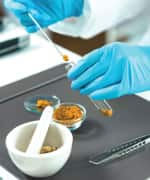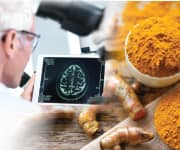Life Extension Magazine®
Curcumin is best known for its anti-inflammatory and anti-cancer properties.
Interestingly, research has identified added benefits for curcumin, specifically for the brain.
In animal and human studies, curcumin has been shown to:1-5
- Form new neurons in the hippocampus.
- Improve performance on memory tests.
- Reduce neuroinflammation.
- Protect against memory loss.
It is challenging to derive these full benefits because curcumin is poorly absorbed.4
Scientists have found that combining curcumin with fenugreek galactomannan increases its bioavailability (absorbability) by up to 45.5 times greater compared to regular curcumin.6
Increasing Curcumin Bioavailability
Curcumin is the main active ingredient in the spice turmeric.
It has potential benefits in combating a range of conditions such as diabetes, arthritis, cancer, and cardiovascular disorders.7,8
But curcumin itself has poor bioavailability. Only a small fraction of the amount consumed is absorbed into the bloodstream. And most of it is metabolized in the body into other compounds or eliminated from the body.9-11
Curcumin’s use for brain disorders is also hindered by its limited ability to cross the blood-brain barrier.
Scientists have discovered a way around these problems.
They found that supplementation with curcumin combined with galactomannans from the herb fenugreek resulted in levels of free curcuminoids in the blood up to 45.5 times greater compared to standard curcumin alone.6
This curcumin-galactomannan complex is able to easily cross the blood-brain barrier to deliver more curcuminoids than unformulated curcumin.6,12
A 2021 animal study shows that this curcumin-galactomannan complex delivered more curcuminoids to the brain’s hippocampus than unformulated curcumin.12
The hippocampus is a region of the brain that has a major role in learning and memory.
Two human studies confirm the brain benefits of this novel curcumin-galactomannan complex.
In one, this formulation was effective at reducing stress, anxiety, and fatigue.13
In a 2020 human study, oral intake of 500 mg of the curcumin-galactomannan complex twice daily resulted in positive changes in brain activity levels and improved performance in audio-visual and memory tests.4
Electroencephalogram (EEG) results verified the curcumin-fenugreek complex’s penetration of the blood-brain barrier, providing brain benefits previously unavailable.
Preventing Cognitive Decline
Neurodegeneration is characterized by the progressive damage and loss of function of neurons that occurs with aging and neurodegenerative diseases.
Some of the common mechanisms underlying these diseases include:
- Chronic inflammation, which can damage brain cells,14
- Oxidative stress, which leads to cell damage and death,15,16 and
- Accumulation of misfolded proteins, which are toxic to neurons.16
Curcumin targets all these problems.
Preclinical research shows that curcumin can reduce neuroinflammation.2,3
Other work in preclinical models shows that curcumin could protect the brain against oxidative stress by activating the protein Nrf2,17,18 which is involved in increasing antioxidant levels in the brain.19
Curcumin also activates antioxidant enzymes such as superoxide dismutase (SOD) and glutathione peroxidase17 and directly neutralizes free radicals.20
Studies in rats show that curcumin can reverse memory loss caused by aging.12,21
Besides its antioxidant and anti-inflammatory effects, curcumin spurs the formation of new neurons in a brain region called the hippocampus.5
A population-level study of elderly Asian individuals showed that regular curcumin intake in the form of curried food was associated with protection against cognitive decline.22
Fighting Parkinson’s Disease
Protecting the Brain with Curcumin
- Curcumin is an active compound in turmeric, the spice. It has potent anti-inflammatory, antioxidant, and anti-cancer properties.
- By reducing inflammation, oxidative stress, and the buildup of toxic proteins, curcumin may prevent cognitive decline.
- Lab and animal research shows this compound may also reduce damage from strokes, prevent Parkinson’s disease, relieve symptoms of multiple sclerosis, and ease diabetic neuropathy.
- Combining curcumin with a fiber called galactomannans makes it up to 45.5 times more bioavailable than standard curcumin. It can also more easily pass through the blood-brain barrier, enabling it to exert its neuroprotective effects.
Parkinson’s disease is a common neurodegenerative disorder that leads to tremors, muscular rigidity, slowness of movement, and difficulty maintaining balance.23
These symptoms are caused by the loss of dopamine neurons in a brain region called the substantia nigra, which plays an important role in movement and motivated behaviors.24
While the underlying cause of Parkinson’s disease is not clearly understood, both mitochondrial dysfunction and oxidative stress have emerged as major contributors to the neurodegeneration seen in Parkinson’s disease.25
Curcumin alleviates both oxidative stress and mitochondrial damage in animal models of Parkinson’s.26,27
In human patients with Parkinson’s disease, low levels of the antioxidant glutathione are observed in dopamine neurons from the substantia nigra. Curcumin activates antioxidant enzymes to prevent the depletion of glutathione.28
Parkinson’s also involves the formation of clumps of the misfolded protein alpha-synuclein.29 These protein aggregates have toxic effects on dopamine neurons.
Preclinical studies show that curcumin can inhibit the accumulation ofalpha-synuclein and prevent the death of dopamine neurons.30,31 This may help slow the development of Parkinson’s disease.
Relieving Multiple Sclerosis Symptoms
Multiple sclerosis is an autoimmune disorder that afflicts over 2.5 million people worldwide.32 Severe cases can lead to vision loss, paralysis, and impaired brain function.
Multiple sclerosis occurs when the immune system causes neuroinflammation in the central nervous system and interruption of the blood-brain barrier.33
This inflammation damages the protective myelin sheath that covers nerve fibers. The resulting harm to neurons hinders their ability to communicate.
Curcumin has been shown, in animal models, to lower levels of pro-inflammatory proteins and aid in myelin repair. This reduced the severity of multiple sclerosis symptoms.33-35
Easing Diabetic Nerve Pain
Neuropathic pain is caused by damage to the nerves that relay pain signals from the muscles and skin to the spinal cord and brain. It often affects patients with diabetes.36
Studies in mice show that curcumin can reduce diabetes-related hyperalgesia (increased sensitivity to pain).37,38
Various inflammatory cytokines, such as nuclear factor-kappa B (NF-kB) and TNF-alpha, are responsible for the pain associated with diabetic neuropathy.39 Curcumin reduces levels of these pro-inflammatory cytokines to relieve hyperalgesia.38
In a rat model of diabetic neuropathy, curcumin reduced the oxidative stress that contributes to the dysfunction of neurons.40
Reducing Damage from Strokes
There are two major types of strokes: ischemic and hemorrhagic.
Ischemic strokes account for almost 90% of all strokes. They are caused by a blood clot or obstruction in an artery. The disruption in blood flow to the brain leads to oxygen deprivation, brain cell death, and damage to the blood-brain barrier.41
Animal studies show that curcumin reduces the size of the ischemic injury and prevents behavioral impairment. Curcumin exerts these neuroprotective effects by:
- Preventing damage to the blood-brain barrier,42
- Inhibiting cell death,43
- Counteracting oxidative stress,44 and
- Reducing the inflammatory response.45
The other main kind of stroke is caused by intracerebral hemorrhage, in which there is a bursting or leaking of a blood vessel. One of its major complications is a cerebral edema, when fluid builds up around the brain. The increased pressure and lower cerebral blood flow can damage brain cells.
Curcumin alleviates edema and reduces behavioral impairments in animal models of intracerebral hemorrhage. It does this by modulating the expression of proteins called aquaporins that reduce brain water content.46
Traumatic brain injuries caused by external mechanical force also result in inflammation, cerebral edema, blood-brain barrier damage, and oxidative stress.47,48 Rodent models show that curcumin can reduce the brain damage caused by trauma by countering these adverse effects.49-51
Summary
Most neurodegenerative diseases share common features, including the accumulation of toxic proteins, inflammation, and oxidative stress.
Curcumin helps reduce or prevent all of these.
Studies have shown that it may help reduce or slow the development of a wide variety of brain disorders.
A curcumin-galactomannan complex is highly absorbable and easily crosses the blood-brain barrier.
If you have any questions on the scientific content of this article, please call a Life Extension Wellness Specialist at 1-866-864-3027.
References
- Voulgaropoulou SD, van Amelsvoort T, Prickaerts J, et al. The effect of curcumin on cognition in Alzheimer’s disease and healthy aging: A systematic review of pre-clinical and clinical studies. Brain Res. 2019 Dec 15;1725:146476.
- Yu Y, Shen Q, Lai Y, et al. Anti-inflammatory Effects of Curcumin in Microglial Cells. Front Pharmacol. 2018;9:386.
- Sunny A, Ramalingam K, Das S, et al. Bioavailable curcumin alleviates lipopolysaccharide-induced neuroinflammation and improves cognition in experimental animals. Pharmacognosy Magazine. 2019 April 1, 2019;15(62):111-7.
- Khanna A, Das SS, Kannan R, et al. The effects of oral administration of curcumin-galactomannan complex on brain waves are consistent with brain penetration: a randomized, double-blinded, placebo-controlled pilot study. Nutr Neurosci. 2020 Dec 9:1-10.
- Dong S, Zeng Q, Mitchell ES, et al. Curcumin enhances neurogenesis and cognition in aged rats: implications for transcriptional interactions related to growth and synaptic plasticity. PLoS One. 2012;7(2):e31211
- Kumar D, Jacob D, Ps S, et al. Enhanced bioavailability and relative distribution of free (unconjugated) curcuminoids following the oral administration of a food-grade formulation with fenugreek dietary fibre: A randomised double-blind crossover study. Journal of Functional Foods. 2016;22:578-87.
- Krup V, Prakash L, Harini A. Pharmacological activities of turmeric (Curcuma longa Linn): a review. J Homeop Ayurv Med. 2013;2(133):2167-1206.1000133.
- Daily JW, Yang M, Park S. Efficacy of Turmeric Extracts and Curcumin for Alleviating the Symptoms of Joint Arthritis: A Systematic Review and Meta-Analysis of Randomized Clinical Trials. J Med Food. 2016 Aug;19(8):717-29.
- Dei Cas M, Ghidoni R. Dietary Curcumin: Correlation between Bioavailability and Health Potential. Nutrients. 2019 Sep 8;11(9):2147.
- Stohs SJ, Chen O, Ray SD, et al. Highly Bioavailable Forms of Curcumin and Promising Avenues for Curcumin-Based Research and Application: A Review. Molecules. 2020 Mar 19;25(6).
- Di Meo F, Margarucci S, Galderisi U, et al. Curcumin, Gut Microbiota, and Neuroprotection. Nutrients. 2019 Oct 11;11(10).
- Kannan RG, Abhilash MB, Dinesh K, et al. Brain regional pharmacokinetics following the oral administration of curcumagalactomannosides and its relation to cognitive function. Nutr Neurosci. 2021 Apr 20:1-12.
- Pandaran Sudheeran S, Jacob D, Natinga Mulakal J, et al. Safety, Tolerance, and Enhanced Efficacy of a Bioavailable Formulation of Curcumin With Fenugreek Dietary Fiber on Occupational Stress: A Randomized, Double-Blind, Placebo-Controlled Pilot Study. J Clin Psychopharmacol. 2016 Jun;36(3):236-43.
- Walker KA. Inflammation and neurodegeneration: chronicity matters. Aging (Albany NY). 2018 Dec 16;11(1):3-4.
- Kim GH, Kim JE, Rhie SJ, et al. The Role of Oxidative Stress in Neurodegenerative Diseases. Exp Neurobiol. 2015 Dec;24(4):325-40.
- Chen X, Guo C, Kong J. Oxidative stress in neurodegenerative diseases. Neural Regen Res. 2012 Feb 15;7(5):376-85.
- Abrahams S, Haylett WL, Johnson G, et al. Antioxidant effects of curcumin in models of neurodegeneration, aging, oxidative and nitrosative stress: A review. Neuroscience. 2019 May 15;406:1-21.
- Balogun E, Hoque M, Gong P, et al. Curcumin activates the haem oxygenase-1 gene via regulation of Nrf2 and the antioxidant-responsive element. Biochem J. 2003 May 1;371(Pt 3):887-95.
- Brandes MS, Gray NE. NRF2 as a Therapeutic Target in Neurodegenerative Diseases. ASN Neuro. 2020 Jan-Dec;12:1759091419899782.
- Hatcher H, Planalp R, Cho J, et al. Curcumin: from ancient medicine to current clinical trials. Cell Mol Life Sci. 2008 Jun;65(11):1631-52.
- Conboy L, Foley AG, O’Boyle NM, et al. Curcumin-induced degradation of PKC delta is associated with enhanced dentate NCAM PSA expression and spatial learning in adult and aged Wistar rats. Biochem Pharmacol. 2009 Apr 1;77(7):1254-65.
- Ng TP, Chiam PC, Lee T, et al. Curry consumption and cognitive function in the elderly. Am J Epidemiol. 2006 Nov 1;164(9):898-906.
- Beitz JM. Parkinson’s disease: a review. Front Biosci (Schol Ed). 2014 Jan 1;6:65-74.
- Available at: https://www.ncbi.nlm.nih.gov/books/NBK470193/. Accessed November 8, 2021.
- Hauser DN, Hastings TG. Mitochondrial dysfunction and oxidative stress in Parkinson’s disease and monogenic parkinsonism. Neurobiol Dis. 2013 Mar;51:35-42.
- Wang XS, Zhang ZR, Zhang MM, et al. Neuroprotective properties of curcumin in toxin-base animal models of Parkinson’s disease: a systematic experiment literatures review. BMC Complement Altern Med. 2017 Aug 17;17(1):412.
- Wang Y-L, Ju B, Zhang Y-Z, et al. Protective effect of curcumin against oxidative stress-induced injury in rats with Parkinson’s disease through the Wnt/-catenin signaling pathway. Cellular Physiology and Biochemistry. 2017;43(6):2226-41.
- Jagatha B, Mythri RB, Vali S, et al. Curcumin treatment alleviates the effects of glutathione depletion in vitro and in vivo: therapeutic implications for Parkinson’s disease explained via in silico studies. Free Radic Biol Med. 2008 Mar 1;44(5):907-17.
- Stefanis L. alpha-Synuclein in Parkinson’s disease. Cold Spring Harb Perspect Med. 2012 Feb;2(2):a009399.
- Sharma N, Nehru B. Curcumin affords neuroprotection and inhibits alpha-synuclein aggregation in lipopolysaccharide-induced Parkinson’s disease model. Inflammopharmacology. 2018 Apr;26(2): 349-60.
- Pandey N, Strider J, Nolan WC, et al. Curcumin inhibits aggregation of alpha-synuclein. Acta Neuropathol. 2008 Apr;115(4):479-89.
- Walton C, King R, Rechtman L, et al. Rising prevalence of multiple sclerosis worldwide: Insights from the Atlas of MS, third edition. Mult Scler. 2020 Dec;26(14):1816-21.
- Qureshi M, Al-Suhaimi EA, Wahid F, et al. Therapeutic potential of curcumin for multiple sclerosis. Neurol Sci. 2018 Feb;39(2):207-14.
- Mohajeri M, Sadeghizadeh M, Najafi F, et al. Polymerized nano-curcumin attenuates neurological symptoms in EAE model of multiple sclerosis through down regulation of inflammatory and oxidative processes and enhancing neuroprotection and myelin repair. Neuropharmacology. 2015;99:156-67.
- Natarajan C, Bright JJ. Curcumin inhibits experimental allergic encephalomyelitis by blocking IL-12 signaling through Janus kinase-STAT pathway in T lymphocytes. J Immunol. 2002;168(12):6506-13.
- Schreiber AK, Nones CF, Reis RC, et al. Diabetic neuropathic pain: Physiopathology and treatment. World J Diabetes. 2015 Apr 15;6(3):432-44.
- Joshi RP, Negi G, Kumar A, et al. SNEDDS curcumin formulation leads to enhanced protection from pain and functional deficits associated with diabetic neuropathy: an insight into its mechanism for neuroprotection. Nanomedicine: Nanotechnology, Biology and Medicine. 2013;9(6):776-85.
- Sharma S, Kulkarni SK, Agrewala JN, et al. Curcumin attenuates thermal hyperalgesia in a diabetic mouse model of neuropathic pain. Eur J Pharmacol. 2006 May 1;536(3):256-61.
- Cameron NE, Cotter MA. Pro-inflammatory mechanisms in diabetic neuropathy: focus on the nuclear factor kappa B pathway. Curr Drug Targets. 2008 Jan;9(1):60-7.
- Zhao WC, Zhang B, Liao MJ, et al. Curcumin ameliorated diabetic neuropathy partially by inhibition of NADPH oxidase mediating oxidative stress in the spinal cord. Neurosci Lett. 2014 Feb 7;560:81-5.
- Available at: https://www.cdc.gov/stroke/types_of_stroke.htm. Accessed November 8, 2021.
- Jiang J, Wang W, Sun YJ, et al. Neuroprotective effect of curcumin on focal cerebral ischemic rats by preventing blood-brain barrier damage. Eur J Pharmacol. 2007 Apr 30;561(1-3):54-62.
- Zhao J, Yu S, Zheng W, et al. Curcumin improves outcomes and attenuates focal cerebral ischemic injury via antiapoptotic mechanisms in rats. Neurochem Res. 2010 Mar;35(3):374-9.
- Wang Q, Sun AY, Simonyi A, et al. Neuroprotective mechanisms of curcumin against cerebral ischemia-induced neuronal apoptosis and behavioral deficits. J Neurosci Res. 2005 Oct 1;82(1):1 38-48.
- Huang L, Chen C, Zhang X, et al. Neuroprotective Effect of Curcumin Against Cerebral Ischemia-Reperfusion Via Mediating Autophagy and Inflammation. J Mol Neurosci. 2018 Jan;64(1): 129-39.
- Wang BF, Cui ZW, Zhong ZH, et al. Curcumin attenuates brain edema in mice with intracerebral hemorrhage through inhibition of AQP4 and AQP9 expression. Acta Pharmacol Sin. 2015 Aug;36(8):939-48.
- Available at: https://www.ncbi.nlm.nih.gov/books/NBK299195/. Accessed November 13, 2021.
- Readnower RD, Chavko M, Adeeb S, et al. Increase in blood-brain barrier permeability, oxidative stress, and activated microglia in a rat model of blast-induced traumatic brain injury. J Neurosci Res. 2010 Dec;88(16):3530-9.
- Laird MD, Sukumari-Ramesh S, Swift AE, et al. Curcumin attenuates cerebral edema following traumatic brain injury in mice: a possible role for aquaporin-4? J Neurochem. 2010 May;113(3):637-48.
- Zhu HT, Bian C, Yuan JC, et al. Curcumin attenuates acute inflammatory injury by inhibiting the TLR4/MyD88/NF-kappaB signaling pathway in experimental traumatic brain injury. J Neuroinflammation. 2014 Mar 27;11(1):59.
- Wu A, Ying Z, Gomez-Pinilla F. Dietary curcumin counteracts the outcome of traumatic brain injury on oxidative stress, synaptic plasticity, and cognition. Exp Neurol. 2006 Feb;197(2):309-17.






